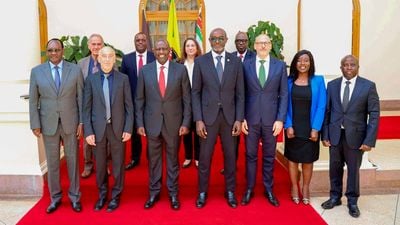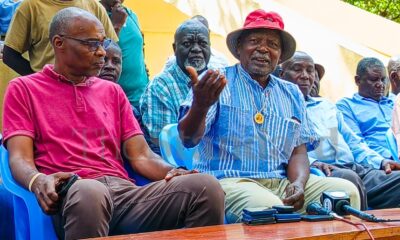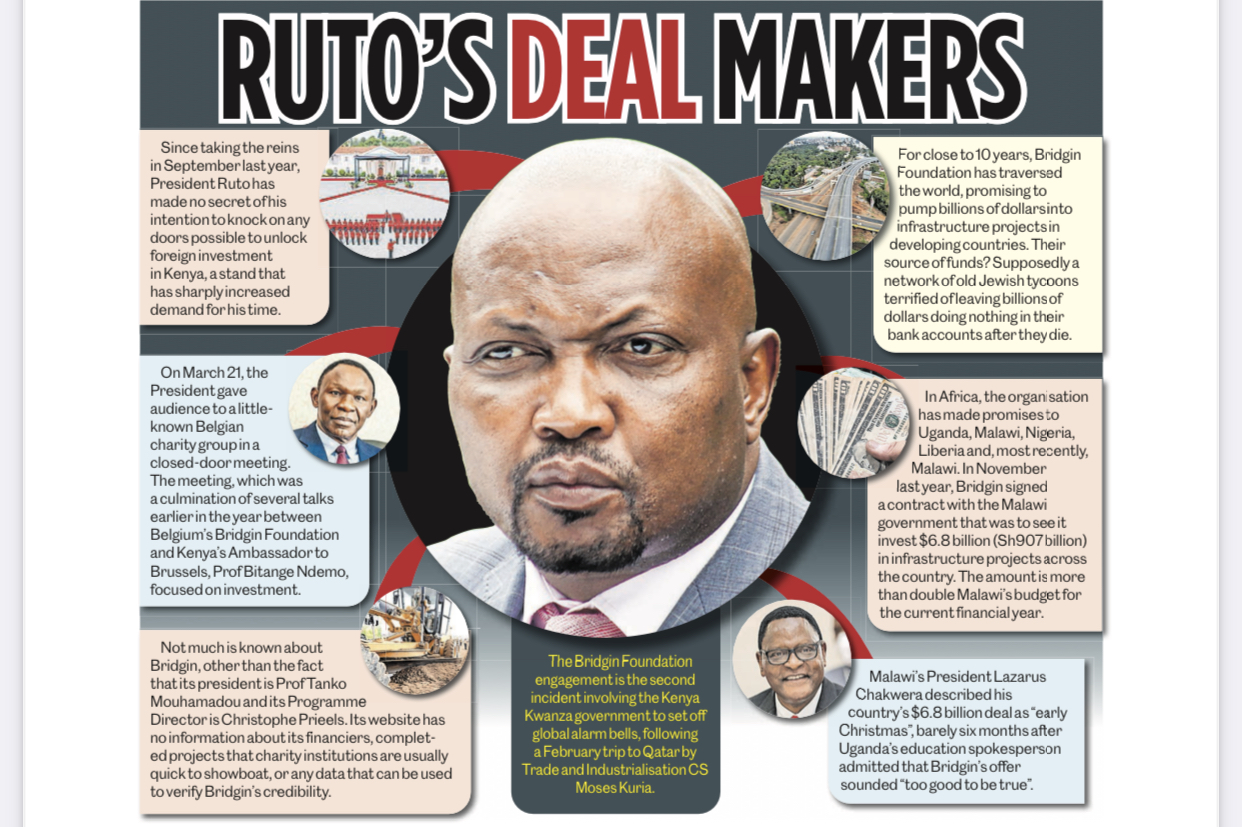Investigations
Ruto’s Mean Deal With Shadowy Belgian Company Raises Eyebrows

For the last seven months, the doors at State House have been revolving endlessly as local and foreign visitors scramble for whatever time they can get with President William Ruto.
Since taking power in September last year, Dr Ruto has made no secret of his intention to knock on any doors to unlock foreign investments, a stand that has sharply increased demand for his time.
March 21 was no different as the President gave audience to a little-known Belgian charity in a closed-door meeting.
The meeting, which was a culmination of talks earlier in the year between Belgium’s Bridgin Foundation and Kenya’s ambassador to Brussels, Bitange Ndemo, focused on investments.
“Following engagements with the mission early this year, the president of Bridgin Foundation yesterday met President @WilliamsRuto and discussed possible projects to be undertaken in the country. @bantigito @ForeignOfficeKE #Partnerships,” the embassy tweeted the following morning.
But the meeting, alongside other engagements with foreign consultants, has raised red flags with the potential of evolving into embarrassing and very expensive mistakes for the taxpayer.
For close to 10 years, Bridgin Foundation has traversed the world, promising to pump billions of dollars into infrastructure projects in developing countries.
Its source of funds? Supposedly a network of old Jewish tycoons terrified of leaving their dollars in their bank accounts after death.
Not much is known about Bridgin, other than the fact that its president is Prof Tanko Mouhamadou and its Programme Director is Christophe Prieels.
The charity’s website has no information about its financiers, completed projects that such institutions are usually quick to showcase, or any data that can be used to verify Bridgin’s credibility.
The website has only one page, which says it is registered in Belgium and aims to assist developing countries.
“For confidentiality and security reasons, this website is intentionally left without detailed content. Should you need further information, please contact us using the button below, Prof Tanko Mouhamadou,” a disclaimer at the bottom of the page reads.
Clicking on the contact button only leads one to a link seeking to register a new email address.
From Uzbekistan and Nepal in Asia and Ecuador in South America, Bridgin has given big pledges that would have made the developing nations better off economically.
In Africa, the same promises have been made to Uganda, Nigeria, Liberia and, most recently, Malawi.
In November last year, Bridgin signed a contract with the Malawi government that was to see it invest $6.8 billion in infrastructure across the country. The amount is more than double Malawi’s budget for the current financial year.
Bridgin promised to start by putting up a state-of-the-art hospital city in Malawi. It says it will spend $1 billion to solve the country’s health needs through the investment.
Malawi has started including some of the projects under the Bridgin contract in its budget.
In Nepal, Bridgin promised Kathmandu University a $120 million hydro-power facility, with 10 per cent of the project funds going into operational costs like staff salaries.
The contract was to be terminated if Bridgin did nothing within 12 months of signing. The 12 months lapsed in 2021.
In Ecuador, it was a $200 million research hospital for Cuenca University.
A similar amount was promised for agriculture and food security projects in Uzbekistan.
But in all these countries where big promises were made, the only thing to show is images of hearty handshakes and smiles during flashy contract-signing events.
The government of Malawi was recently left with egg on face when journalists from a local publication, The Nation, revealed that taxpayers footed travel and accommodation bills for Bridgin Foundation officials during the contract-signing visit.
Prof Mouhamadou claimed in his response that the money would be refunded when Bridgin starts pouring dollars into Malawi’s infrastructure.
But the company’s track record indicates that Malawian taxpayers may have to accept that they simply gave an all-expenses-paid trip to Prof Mouhamadou and his team.
Prof Ndemo has not responded to our calls or text messages on whether there is a formal arrangement in the works with Bridgin Foundation, or if taxpayers have dug into their pockets to facilitate engagements that have happened with the shadowy institution.
When Belgian reporters affiliated to the International Consortium of Investigative Journalists visited a building Bridgin Foundation claims to operate from in Brussels, they found no indication it has offices there.
The building is in the European Quarter, a section of the capital city that hosts offices of several EU institutions.
The building employees confirmed that Bridgin periodically hires a room to hold meetings.
It means the institution that has signed billion-dollar contracts with several countries – with Kenya seemingly almost joining the club – has no verifiable physical presence.
Bridgin was incorporated in Belgium on November 18, 2014.
Other than Prof Mouhamadou and Prieels, Bridgin has Bourgys Sébastien Stéphane and Ruessmann Florence as its directors.
Bastin Yves Jean left the directorship in 2020.
Investigative journalism firm, AmaBhungane, established that Bridgin has never filed annual accounts with Belgian authorities since incorporation. The organisation has only filed tax returns.
Malawi’s President Lazarus Chakwera described his country’s $6.8 billion deal as “early Christmas”, barely six months after Uganda’s education spokesperson admitted that Bridgin’s offer sounded “too good to be true”.
Last month, Prof Mouhamadou told AmaBhungane that the agency operates using the Judaist spirit of Tikkun olam.
In Tikkun olam, subscribers take remedial action to repair the world and leave it a better place.
The Bridgin Foundation engagement is the second incident involving the Kenya Kwanza government to set off international alarm bells, following a February trip to Qatar by Trade and Industrialisation Cabinet Secretary Moses Kuria.
Three days before Mr Kuria led a team of 30 for an investment forum in Doha, a letter detailing the travel party’s identities was leaked to journalists at the Nation Media Group.
Mr Alexandr Zingman, 56, and Mr Oleg Vodchits, 36, were listed in a February 24 letter from the Foreign Affairs Ministry to the Qatari embassy as being in a team from Mr Kuria’s ministry that was to fly to Doha for a five-day event starting on February 27.
To justify the two Belarusians’ presence in his team, the minister listed them as advisers on countries.
Mr Zingman owns Aftrade DMCC, a company that trades agricultural equipment and solutions with African countries. Mr Vodchits is the CEO.
The Dubai-registered company has a local presence and has sold tractors to Kenyan farmers.
Mr Zingman is close to Mr Segei Sheiman, an associate of Belarus President Alexander Lukashenko.
The two were arrested in the Democratic Republic of Congo in 2021 over links to shady dealings with gold. He has in the past been linked to arms sales in Zambia and Zimbabwe.
Mr Zingman and Mr Sheiman have gold dealings in the DR Congo, Zimbabwe and Mozambique. Their Zimbabwe gold businesses were falsely presented to the public as a joint venture between Zimbabwe and Belarus.
Mr Zingman was among individuals unmasked in the 2021 Pandora Papers – a trove of documents revealing registration of shell companies in tax havens by hundreds of influential individuals across the world – over the Zimbabwe dealings.
He used shell companies registered in the UK and the Seychelles in an attempt to hide his ownership of Zim Goldfields, the company at the heart of the shady gold dealings.
Zim Goldfields was in 2018 granted a licence to mine gold in a section of River Mutare in eastern Zimbabwe. It also bagged prospecting deals for platinum and rare earth metals.
Initially, the contracts were painted as government-to-government deals, only for the Pandora Papers to reveal that they were benefiting private institutions. Zimbabwean authorities insist that Mr Zingman is a legitimate businessman whose dealings with the country are above board.
He is honorary consul of Belarus to Zimbabwe. Mr Zingman is an ally of Zimbabwean President Emmerson Mnangagwa, former DR Congo leader Joseph Kabila, Mr Kuria and other leaders.
When asked about the two Belarusians in his trip to Qatar, the CS said no one had a right to ask questions about his friends.
Mr Kuria said the Belarusians would foot their bills for the Qatari excursion, hence there was no need to reveal any information on their role in the ministry.
Mr Kuria and his Foreign and Diaspora Affairs colleague, Alfred Mutua, met Belarusian Foreign Affairs Minister Sergei Aleinik at the country’s embassy on Monday and discussed bilateral ties.
Mr Aleinik also met President Ruto, who urged Belarus to consider investing in Kenya.
(Weekly Review).
Kenya Insights allows guest blogging, if you want to be published on Kenya’s most authoritative and accurate blog, have an expose, news TIPS, story angles, human interest stories, drop us an email on [email protected] or via Telegram
-

 Business2 weeks ago
Business2 weeks agobetPawa Empire Crumbles: Mr Eazi’s Betting Gambit Unravels Amid Partner’s Shadowy Deals
-

 Business1 week ago
Business1 week agoMinnesota Fraud, Rice Saga, Medical Equipment Deal: Why BBS Mall Owner Abdiweli Hassan is Becoming The Face of Controversial Somali Businessman in Nairobi
-

 News1 week ago
News1 week agoDCI Probes Meridian Equator Hospital After Botched Procedure That Killed a Lawyer
-

 Politics1 week ago
Politics1 week agoYour Excellency! How Ida’s New Job Title From Ruto’s Envoy Job Is Likely to Impact Luo Politics Post Raila
-

 Investigations2 weeks ago
Investigations2 weeks agoEXPOSED: SHA Officials Approve Higher Payments for Family, Friends as Poor Patients Pay Out of Pocket
-

 News1 week ago
News1 week agoKenya Stares At Health Catastrophe As US Abandons WHO, Threatens Billions In Disease Fighting Programmes
-

 Politics2 weeks ago
Politics2 weeks agoJaramogi Clan Tells Raila Jr, Winnie Against Disrespecting Their Uncle Oburu, Warns of Curses
-

 Business2 weeks ago
Business2 weeks agoKRA Boss Humphrey Watanga In Big Trouble In Sh5.5 Billion Rice Import Scandal


















